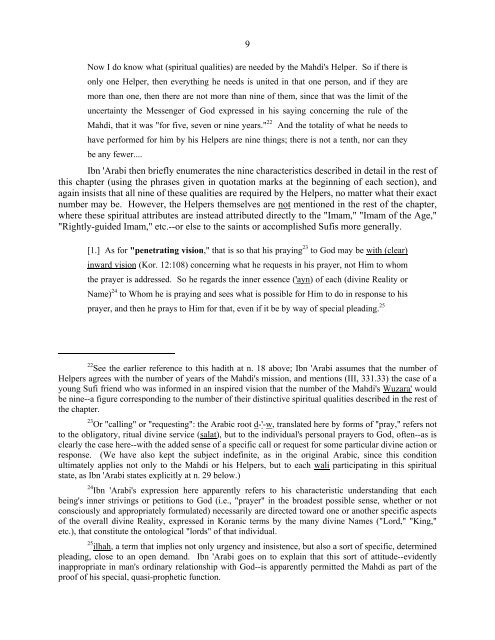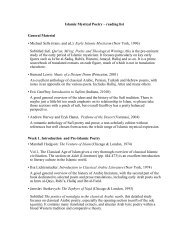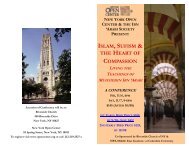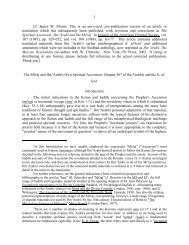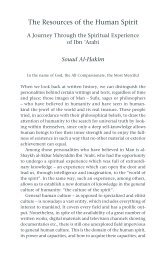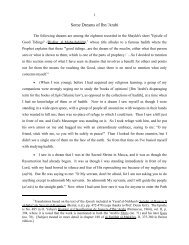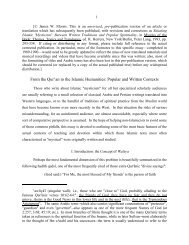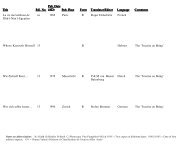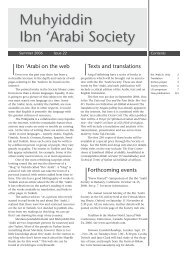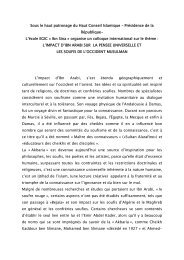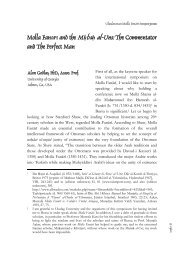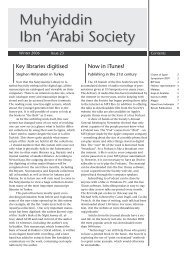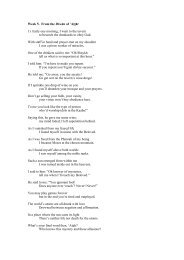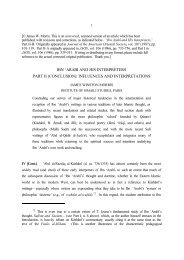The Mahdi and His Helpers - Muhyiddin Ibn Arabi Society
The Mahdi and His Helpers - Muhyiddin Ibn Arabi Society
The Mahdi and His Helpers - Muhyiddin Ibn Arabi Society
You also want an ePaper? Increase the reach of your titles
YUMPU automatically turns print PDFs into web optimized ePapers that Google loves.
9Now I do know what (spiritual qualities) are needed by the <strong>Mahdi</strong>'s Helper. So if there isonly one Helper, then everything he needs is united in that one person, <strong>and</strong> if they aremore than one, then there are not more than nine of them, since that was the limit of theuncertainty the Messenger of God expressed in his saying concerning the rule of the<strong>Mahdi</strong>, that it was "for five, seven or nine years." 22 And the totality of what he needs tohave performed for him by his <strong>Helpers</strong> are nine things; there is not a tenth, nor can theybe any fewer....<strong>Ibn</strong> '<strong>Arabi</strong> then briefly enumerates the nine characteristics described in detail in the rest ofthis chapter (using the phrases given in quotation marks at the beginning of each section), <strong>and</strong>again insists that all nine of these qualities are required by the <strong>Helpers</strong>, no matter what their exactnumber may be. However, the <strong>Helpers</strong> themselves are not mentioned in the rest of the chapter,where these spiritual attributes are instead attributed directly to the "Imam," "Imam of the Age,""Rightly-guided Imam," etc.--or else to the saints or accomplished Sufis more generally.[1.] As for "penetrating vision," that is so that his praying 23 to God may be with (clear)inward vision (Kor. 12:108) concerning what he requests in his prayer, not Him to whomthe prayer is addressed. So he regards the inner essence ('ayn) of each (divine Reality orName) 24 to Whom he is praying <strong>and</strong> sees what is possible for Him to do in response to hisprayer, <strong>and</strong> then he prays to Him for that, even if it be by way of special pleading. 2522 See the earlier reference to this hadith at n. 18 above; <strong>Ibn</strong> '<strong>Arabi</strong> assumes that the number of<strong>Helpers</strong> agrees with the number of years of the <strong>Mahdi</strong>'s mission, <strong>and</strong> mentions (III, 331.33) the case of ayoung Sufi friend who was informed in an inspired vision that the number of the <strong>Mahdi</strong>'s Wuzara' wouldbe nine--a figure corresponding to the number of their distinctive spiritual qualities described in the rest ofthe chapter.23 Or "calling" or "requesting": the <strong>Arabi</strong>c root d-'-w, translated here by forms of "pray," refers notto the obligatory, ritual divine service (salat), but to the individual's personal prayers to God, often--as isclearly the case here--with the added sense of a specific call or request for some particular divine action orresponse. (We have also kept the subject indefinite, as in the original <strong>Arabi</strong>c, since this conditionultimately applies not only to the <strong>Mahdi</strong> or his <strong>Helpers</strong>, but to each wali participating in this spiritualstate, as <strong>Ibn</strong> '<strong>Arabi</strong> states explicitly at n. 29 below.)24 <strong>Ibn</strong> '<strong>Arabi</strong>'s expression here apparently refers to his characteristic underst<strong>and</strong>ing that eachbeing's inner strivings or petitions to God (i.e., "prayer" in the broadest possible sense, whether or notconsciously <strong>and</strong> appropriately formulated) necessarily are directed toward one or another specific aspectsof the overall divine Reality, expressed in Koranic terms by the many divine Names ("Lord," "King,"etc.), that constitute the ontological "lords" of that individual.25 ilhah, a term that implies not only urgency <strong>and</strong> insistence, but also a sort of specific, determinedpleading, close to an open dem<strong>and</strong>. <strong>Ibn</strong> '<strong>Arabi</strong> goes on to explain that this sort of attitude--evidentlyinappropriate in man's ordinary relationship with God--is apparently permitted the <strong>Mahdi</strong> as part of theproof of his special, quasi-prophetic function.


